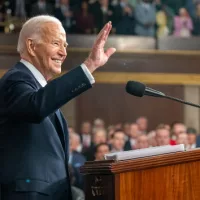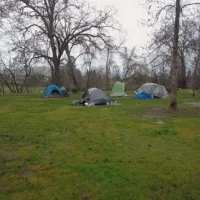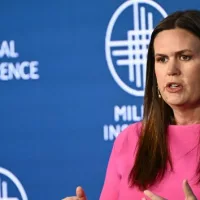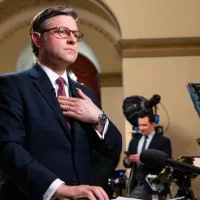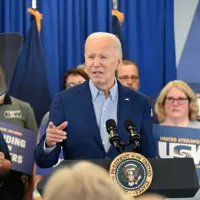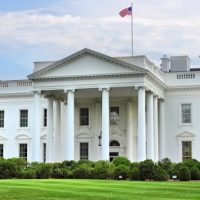
 tupungato/iStock(WASHINGTON) — As he left the White House Wednesday morning heading to Dayton, Ohio, and El Paso, Texas, to visit the scenes of the weekend mass shootings amid criticism his divisive rhetoric was partly to blame, President Donald Trump repeated new claims from conservative media and some Republicans that the Dayton shooter was a liberal sympathizer.
tupungato/iStock(WASHINGTON) — As he left the White House Wednesday morning heading to Dayton, Ohio, and El Paso, Texas, to visit the scenes of the weekend mass shootings amid criticism his divisive rhetoric was partly to blame, President Donald Trump repeated new claims from conservative media and some Republicans that the Dayton shooter was a liberal sympathizer.
“This person supported Bernie Sanders, Antifa and Elizabeth Warren, I understand — nothing to do with President Trump,” he said, speaking to reporters on the White House South Lawn, referring to two of the 2020 Democratic candidates and the left-wing, anti-fascist group.
He repeated the claim that the Dayton shooter was “a fan of Bernie Sanders and Elizabeth Warren. Nothing to do with Trump, but nobody mentions that,” he said.
Law enforcement authorities have said they can’t say yet what the Dayton shooter’s motive was and experts analyzing his social media posts told ABC News his political views do not — at this point– appear to be a key reason for his attack. Dayton Police Chief Richard Biehl said on Tuesday that “while we do not have true clarity on the motive of the assailant,” evidence has revealed the gunman had a “history of obsessions with violent ideations” and that he “expressed the desire” to commit a mass shooting.
“These are people looking for political gain,” he said referring to his critics, Sanders and Warren among the harshest. “As much as possible I try to stay out of that.”
“They’re trying to make political points,” Trump said. “I would like to stay out of the political fray.”
“I don’t blame Elizabeth Warren and I don’t blame Bernie Sanders. I don’t blame anybody — these are sick people,” the president said talking about the gunmen.
Asked about the threat of white supremacy, Trump said, “I am very concerned about the rise of any group of hate. I don’t like it, any group of hate, whether it’s white supremacy, whether it’s any other kind of supremacy, with it’s Antifa — I am very concerned about it and I’ll do something about it.”
“I think my rhetoric brings people together,” he said.
Asked about gun control efforts, Trump said he’s “looking to do background checks … they’re important,” claiming there’s “great appetite for background checks.”
“I’ll be convincing some people to do things that they don’t want to do … I have a lot of influence with a lot of people and I want to convince them to do the right thing … we’ve made a lot of headway in the last three days,” he said, apparently referring to consultations with GOP congressional leaders as he and they face pressure to act in the face of the latest shootings.
At the same time, Trump appeared to downplay any effort to restrict or ban assault weapons or high-capacity ammunition magazines of the kinds used in the shootings, saying there’s “great appetite to do something to make sure that mentally unstable, seriously ill people aren’t carrying guns … I have not seen it in regard to certain types of weapons.”
Once he arrives in Ohio and Texas, the White House said the president plans to offer his condolences to victims, meet with leaders and talk about his plans to combat the scourge of gun violence in the United States. Trump, who had an empty public schedule on Tuesday, spent the day preparing for his encounters with the grieving communities, according to a White House official. But some are questioning the presence of the president, whose rhetoric, they say, encouraged the shooters and has fanned the flames of division.
White House counselor Kellyanne Conway said the president travels to “heal communities” by meeting with the injured, survivors, local law enforcement and medical professionals. In what has become routine for modern presidents, Trump visited victims and local law enforcement in the aftermath of mass shootings like Parkland, Florida, and Pittsburgh. But in El Paso — a border city with a large Latino population — some residents questioned why the president would visit.
“Why would he want to come? That would be my first — I know he’s our president, but he has promoted a lot of this — all this anger. He has promoted it across the nation and it needs to stop, it needs to stop,” Bill Aguirre, a veteran and El Paso native told ABC News.
El Paso County Commissioner David Stout told ABC News Senior Washington Reporter Devin Dwyer on “The Briefing Room” Tuesday that there’s “a gaping wound that’s still open here” and that a lot of people feel that Trump’s presence in the community is “just going to be throwing salt in an open wound.”
Rep. Veronica Escobar, D-Texas, said on MSNBC Monday that Trump “is not welcome” in El Paso. “He should not come here while we are in mourning.”
On Twitter Tuesday, she also posted a thread about how she declined the president’s invitation to join him during his visit to El Paso and said she requested a phone call with him instead.
However, El Paso Mayor Dee Margo said he would welcome Trump, “as he is president of the United States.”
“So in that capacity, I will fulfill my obligations as mayor of El Paso to meet with the president and discuss whatever our needs are in this community and hope that if we are expressing specifics that we can get him to come through for us,” Margo said.
Stephanie Whiddon, who recently moved to El Paso from Indiana, was not opposed to the visit and said it could be a learning opportunity.
“He should come, he should see what we’re going through. The pain that this community is feeling right now, the pain that their families are suffering. He needs to be a part of that.”
In her comments on Monday, Escobar specifically pointed to the president’s language when she said Trump wasn’t welcome.
“Words have consequences. And the president has made my community and my people the enemy. He has told the country that we are people to be feared, people to be hated. He has done that at his rallies, he has done that through his Twitter,” Escobar said. “And so I would ask his staff and his team to consider the fact that his words and his actions have played a role in this.”
The El Paso shooting suspect allegedly said he wanted to target as many Mexicans as he could in his deadly rampage at a Walmart, and used white nationalist rhetoric. In a speech at the White House on Monday, the president condemned hate speech and white nationalism that was hailed by the suspect in El Paso.
But Dayton Mayor Nan Whaley said his comments on Monday fell short of unifying.
“I’m disappointed with his remarks. I think they fell really short. He mentioned gun issues one time. I think watching the president over the past few years on issues of guns, he has been — I don’t know if he knows what he believes, frankly,” Whaley said.
On Tuesday, she told reporters that she planned to tell Trump “how unhelpful he’s been” with regard to his comments about how to tackle gun violence, but deflected when she was asked if she thought the president was visiting Dayton too soon after the shootings.
“He’s the president of the United States. He does his calendar, I do mine,” she said.
Later, she said, “I will welcome him in the official capacity as mayor since he is in the office of the president.”
Copyright © 2019, ABC Radio. All rights reserved.






